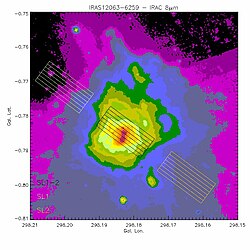
Summary
IRAS 12063-6259 is a compact H II region in the constellation of Crux. It lies at a heliocentric distance of roughly 9.5 kpc and a galactocentric distance of 9.3 kpc.[1] Although previously classified as a planetary nebula as well as an H II region, this source is now solely classified as a normal compact H II region, due to its colour criteria,[2] its infrared luminosity, and its spectral content.[3]
| Emission nebula | |
|---|---|
| H II region | |
 | |
| Observation data: J2000 epoch | |
| Right ascension | 12h 09m 01.1s |
| Declination | −63° 15′ 54.7″ |
| Distance | 30,985 ly (9,500 pc) |
| Apparent dimensions (V) | 16"x7" |
| Constellation | Crux |
| Physical characteristics | |
| Radius | 1.20 ly |
| Notable features | star forming region |
| Designations | G298.19-0.78,RAFGL 4144, He 2-77, PK 298-00.1 |
Radio observations from the Australia Telescope Compact Array (ATCA) reveal IRAS 12063-6259 to consist of a compact object roughly 16"x7" which is embedded in a low brightness region 28"x25". The compact region contains two compact objects at 4.8 GHz, labelled Radio A and Radio B, while at higher frequencies (8.6 GHz) Radio B is further resolved into subcomponents B1 and B2. This complex substructure points towards the presence of multiple ionising stars rather than a single star.[4]
References edit
- ^ Caswell, J.L., & Haynes, R.F. 1987, A&A, 171, 261
- ^ Wood, D.O.S., & Churchwell, E. 1989, ApJ, 340, 265
- ^ Peeters, E., Martín-Hernández, N.L., Damour, F., Cox, P., Roelfsema, P.R., Balutea, J.-P., Tielens, A.G.G.M., Churchwell, E., Kessler, M.F., Mathis, J.S., Morisset, C., & Schaerer, D. 2002, A&A, 381, 571
- ^ Martín-Hernández, N.L., van der Hulst, J.M., & Tielens, A.G.G.M. 2003, A&A, 407, 957
External links edit
- IRAS 12063-6259 on WikiSky: DSS2, SDSS, GALEX, IRAS, Hydrogen α, X-Ray, Astrophoto, Sky Map, Articles and images


